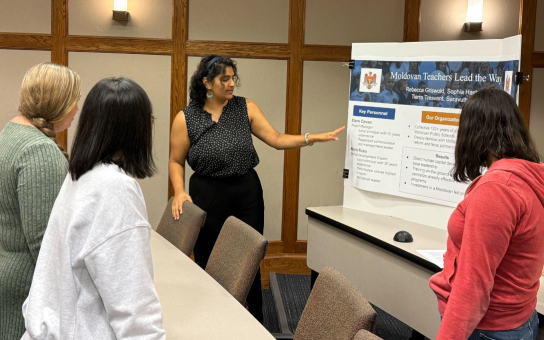Students build career-ready grant writing skills in Aid & Development Workshop series

Mastering technical and theoretical content is just the beginning for public policy students.
Paulo Quequezana Barrientos (MPP ‘26), and 18 of his colleagues recently completed the annual Aid & Development Workshop series, designed to complement their classroom experiences and deliver practical, transferable skills for their future careers. This year, students were challenged with the real-world demands of grant writing, proposal development, and strategic budgeting—tasked with building a competitive grant application for a real solicitation from the UN/EU to improve education outcomes in Moldova. Student groups took on the roles of different organizations applying for funding, and, over four sessions, developed and presented a professional-grade proposal.
A person presents a poster titled "Moldovan Teachers Lead the Way" to three attentive listeners in a conference room.
For Barrientos, the workshop provided hands-on experience with proposal development that he hadn’t encountered before. “I saw this as an opportunity to gain insights into preparing grants. In our public management classes we talk a lot about the grant process, but this gave me an opportunity to focus on the budget components,” said Barrientos, who spent six years working in policy research with government agencies and the private sector in Peru and recently completed an internship at the World Bank.
Attendees engage in conversation next to a poster titled "Higher Education Reform Experts Moldova."
With only about a week to build the proposal, the workshop also gave him a better understanding of what a grant process looks like in the real world and a chance to sharpen his communication skills.
Ford School lecturer Amy Beck Harris, who co-led the workshop, explained the goal was to give students a practical toolkit to draw on in the future. “I hoped the training would reframe how students write grant applications so that the applications are targeted towards donor goals and preferences. And then develop tangible tools/checklists/processes to ensure they're delivering on those donor goals/preferences. I also wanted them to be able to 'check all the donor boxes' (make it easy for donors to see why they're a good pick), and tell a compelling story/pitch that makes a donor WANT to pick them.”
Harris said the students really delivered, not only in their presentations but also in the way they were able to answer unexpected questions.
Dan Ellis, assistant director of the International Policy Center (IPC), agreed. “I posed some challenging questions to mimic the types of questions/comments from a prospective donor. Students adapted quickly, providing thoughtful responses throughout. It was also clear to me that they had taken their proposal development work seriously.”
This year’s workshop also drew on the budget and public management expertise of Stephanie Leiser, who serves as the director of the Center for Local, State, and Urban Policy (CLOSUP). “Once you say budgets, I’m in,” laughed Leiser. “It was so much fun to work with the students to explore how the numbers connect to stories they're trying to tell, but it's a very difficult thing to do in practice —to make sure the numbers, the assumptions, the narrative, and the big picture story—are all aligned.”
She added, “Through the workshop sessions, we got the chance to go through a couple rounds of drafts and feedback, so it was really wonderful to see how their strategies evolved and became more nuanced and sophisticated as they thought through different aspects of the scenario. When it came time to do the presentations, I was really impressed by how far they had come.”
Alice Kinney (MPP ‘27) said she appreciated the workshop being co-sponsored by IPC and CLOSUP because she knew that she could gain lessons applicable for both domestic and international policy professionals. Kinney, who previously worked to administer and monitor federal grants, said the workshop helped her “understand what goes into grant applications before an organization clicks submit. As I shift away from federal policy implementation and transition into state and local leadership, I will be using the grant writing skills I honed in this workshop to (hopefully) bring supplemental funding into my future organization.”
Group of students holding certificates in a classroom at the University of Michigan, smiling proudly. Aid & Development participants hold their certificates of completion of workshops series
About the Aid & Development Workshop
The annual Aid & Development Workshop series, hosted by the Ford School’s International Policy Center (IPC) and co-sponsored this year by the Center for Local, State, and Urban Policy (CLOSUP), offers Ford School students essential hands-on training. The workshop is an applied learning experience, designed to help participants build practical expertise required by the international development job market, and to respond effectively to the shifting international policy landscape.

